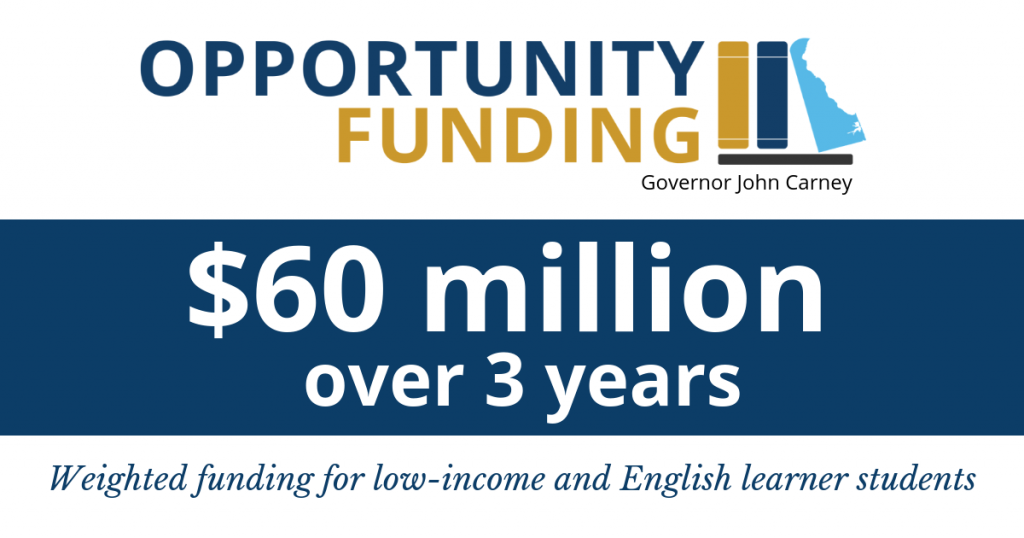Settlement agreement in Chancery Court case would make Opportunity Funding permanent and expand funding for high-needs schools
WILMINGTON, Del. – Governor John Carney on Monday announced an agreement with Delawareans for Educational Opportunity and the Delaware NAACP to make significant new investments in Delaware public schools and dedicate additional funding for Delaware’s most disadvantaged students to help close achievement gaps.
The settlement agreement announced on Monday suspends litigation currently pending in Delaware’s Court of Chancery and creates a path forward to provide substantial additional support for Delaware schools, high-needs students and educators.
The agreement announced on Monday will:
- More than double funding for Opportunity Funding to $60 million annually by Fiscal Year 2025, and make the weighted funding program permanent. Funding will increase automatically with enrollment beyond 2025.
- Double funding for the Early Childhood Assistance Program (ECAP) to expand access to affordable early education.
- Provide full funding for K-3 basic special education, consistent with grades 4-12.
- Provide additional funding for teacher recruitment and retention in high-needs schools.
Opportunity Funding provides targeted funding – for the first time in Delaware’s history – for low-income students and English learners statewide. Members of the Delaware General Assembly must approve terms the agreement as part of the regular budget and legislative process.
“It’s important to make clear that both parties viewed this case and these settlement negotiations as an opportunity to make real progress for Delaware’s children,” said Governor Carney. “This is a path forward to support our most disadvantaged students and families – and one that will help close the persistent achievement gap in our schools.
“But our work is just getting started,” said Governor Carney. “The General Assembly will need to consider these changes as part of its regular budget process in Dover. I look forward to discussions with legislators. Delaware’s General Assembly has supported increased investments in public education over the last four years and I believe legislators of both parties will see the merit in this proposal.”
“Every student – regardless of zip code or background – deserves a high-quality public education. And yet, Delaware’s current education funding formula fails to account for the simple fact that in order to succeed, children with the greatest needs require the most support,” said Senator Elizabeth Lockman. “That is the reform we are all working towards and the settlement announced today marks a potential step forward in our efforts to create a funding formula that is truly equitable for all students. I’m thankful to have the opportunity to fully discuss the details of the proposal with my colleagues, parents, educators and taxpayers in the weeks ahead.”
“As a mother of two children who were identified very early as developmentally delayed, I know firsthand how important it is to have teachers in place to provide quality services,” said Representative Kim Williams, a longtime advocate for K-3 special education funding. “Research has proven that early identification and intervention are critical to a child’s overall success. By the time a child reaches third grade, they should be transitioning from learning to read to reading to learn. If we are committed to fundamentally improving the quality of education in our state, then we must make a commitment early on.”
“In 2015, while serving as Chair of the Wilmington Education Advisory Committee, WEAC received input from thousands of Delawareans up and down the state – parents, lawmakers, educators, community partners, politicians alike,” said Dr. Tony Allen, President of Delaware State University. “That input continued when WEAC morphed into the Commission. At that time, not one person said that the last 60 years of K12 education for students from economically distressed communities was sustainable, appropriate, or fair. The settlement reached today proves the point and represents a principled commitment to what I believe is a fundamental American right — every child’s access to a quality education. In the spirit of the indomitable Louis L. Redding, Chancellor Collins Seitz, and many more, may we forever be compelled to a higher purpose and greater sense of responsibility for our fellow citizens – particularly the most vulnerable among us.”
“This agreement will continue our work to support the Delaware students and educators who need our help the most,” said Dr. Susan Bunting, Secretary of the Delaware Department of Education. “Through our Opportunity Funding program, low-income students and young English learners already are receiving additional support, and that work will expand statewide. We will provide new services for young students with special needs, and early childhood education. Our team at the Department of Education looks forward to working with educators to make a real difference for Delaware children with these additional resources.”
“For years, our members have been advocating for the resources needed to meet the needs their of English Learners, low-income, and k-3 basic special education students,” said Stephanie Ingram, President of the Delaware State Education Association. “This sustainable funding will do just that and continue to supply educators with the resources they need. We are hopeful that the General Assembly will make this a permanent part of our funding, and address the structural short comings in education funding in Delaware.”
“On behalf of the Delaware Hispanic Commission and the many English Learners and their families, we want to thank Governor Carney and Secretary Bunting for their leadership in bringing the much-needed permanent funding for children who are at risk in Delaware,” said Javier Torrijos, chair of the Delaware Hispanic Commission. “Children of poverty and English learners need the resources to keep pace with their peers. School districts will be able to look at long-term programs and provide the resources to meet these students’ needs. We are extremely grateful and after many years of advocacy we see this as a major victory for all Delawareans and more importantly the future of our children and this great state.”
###
